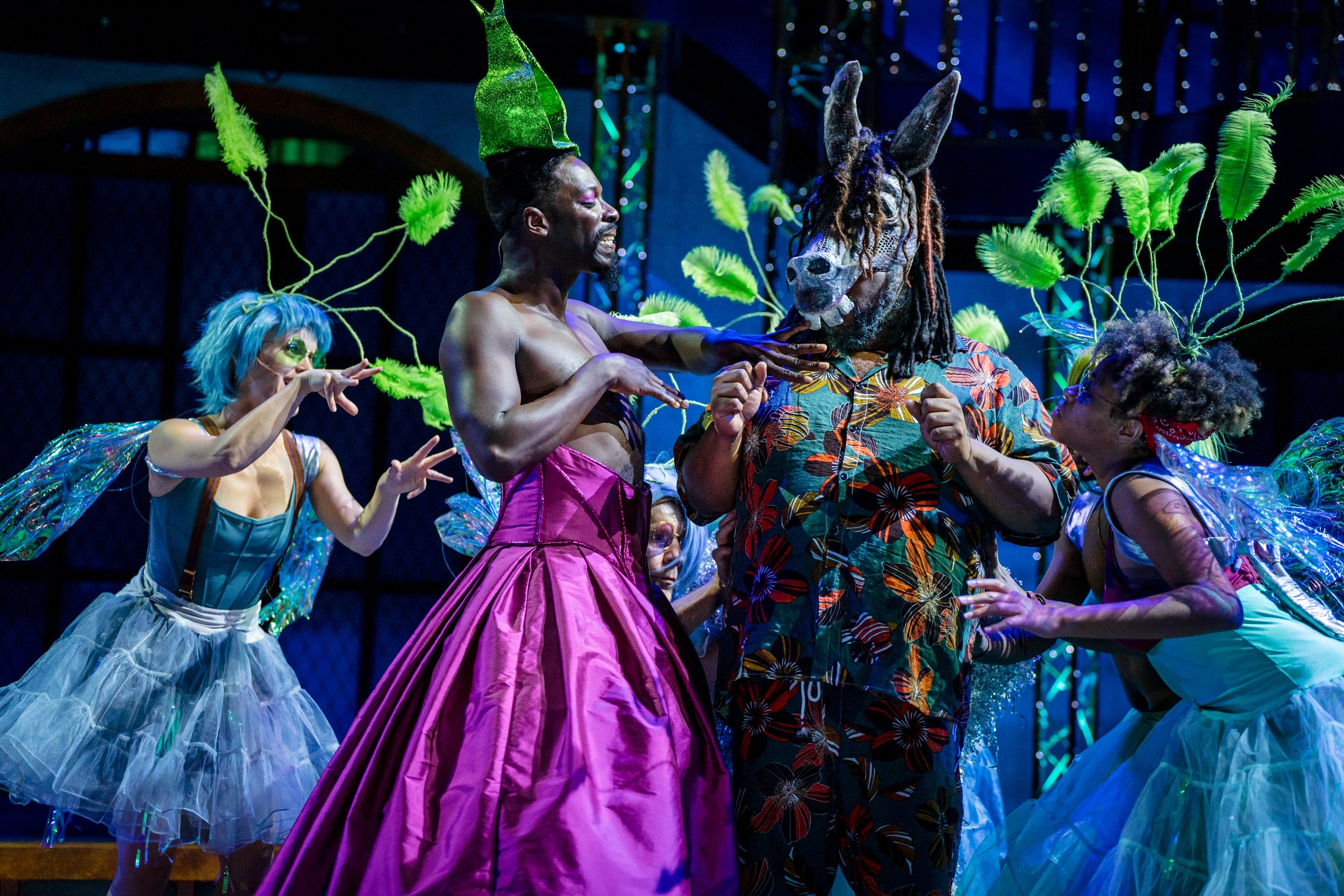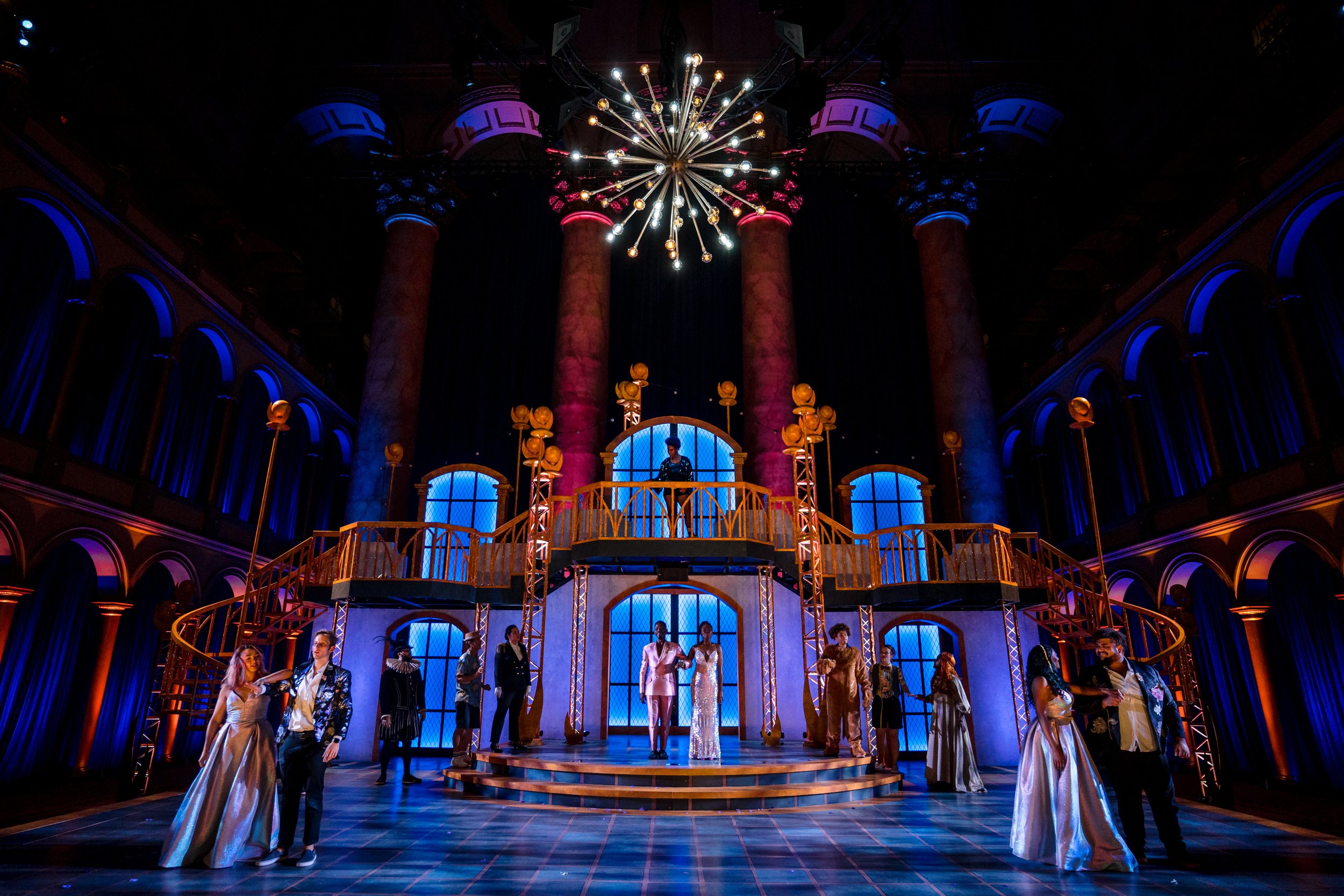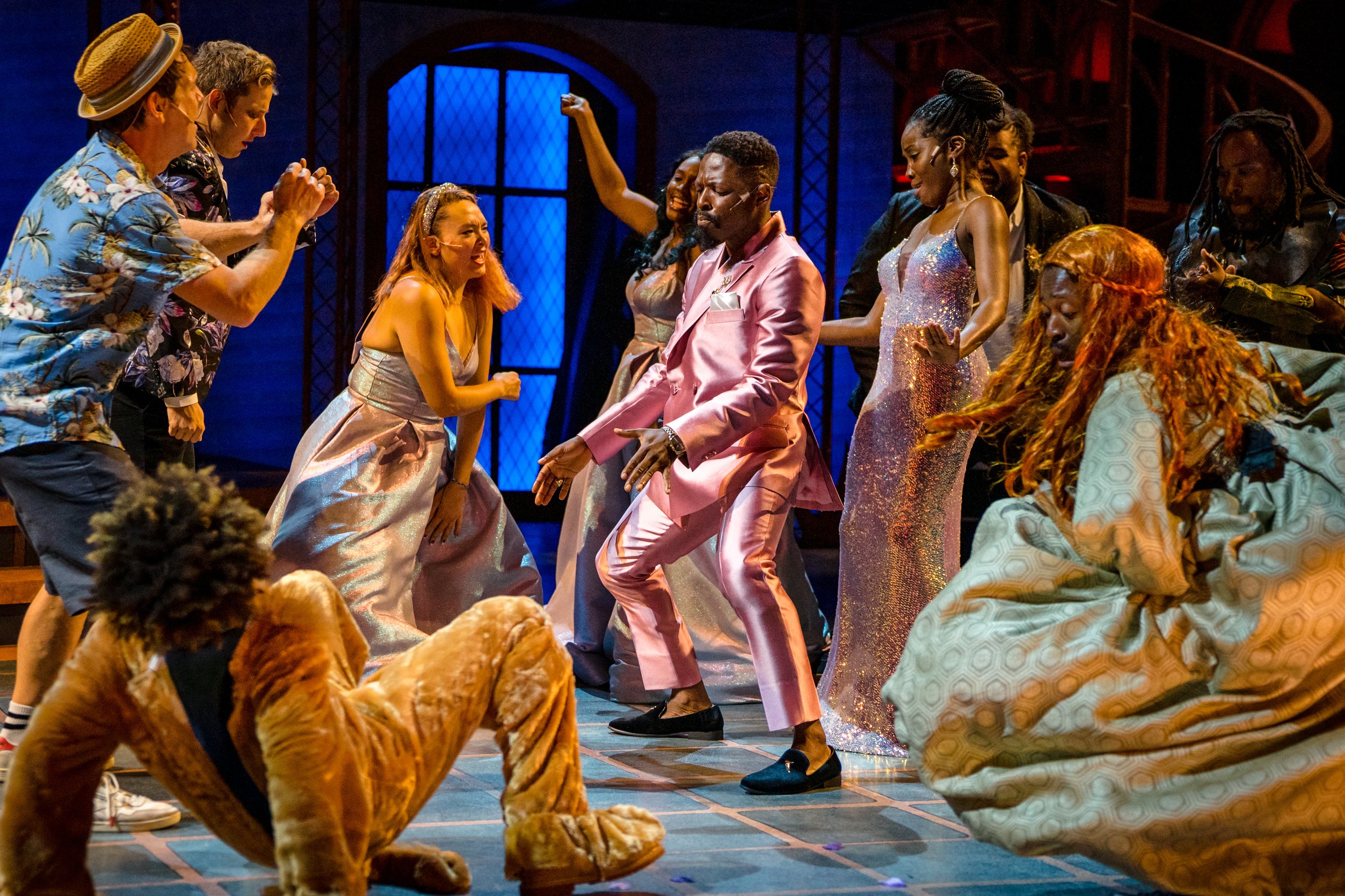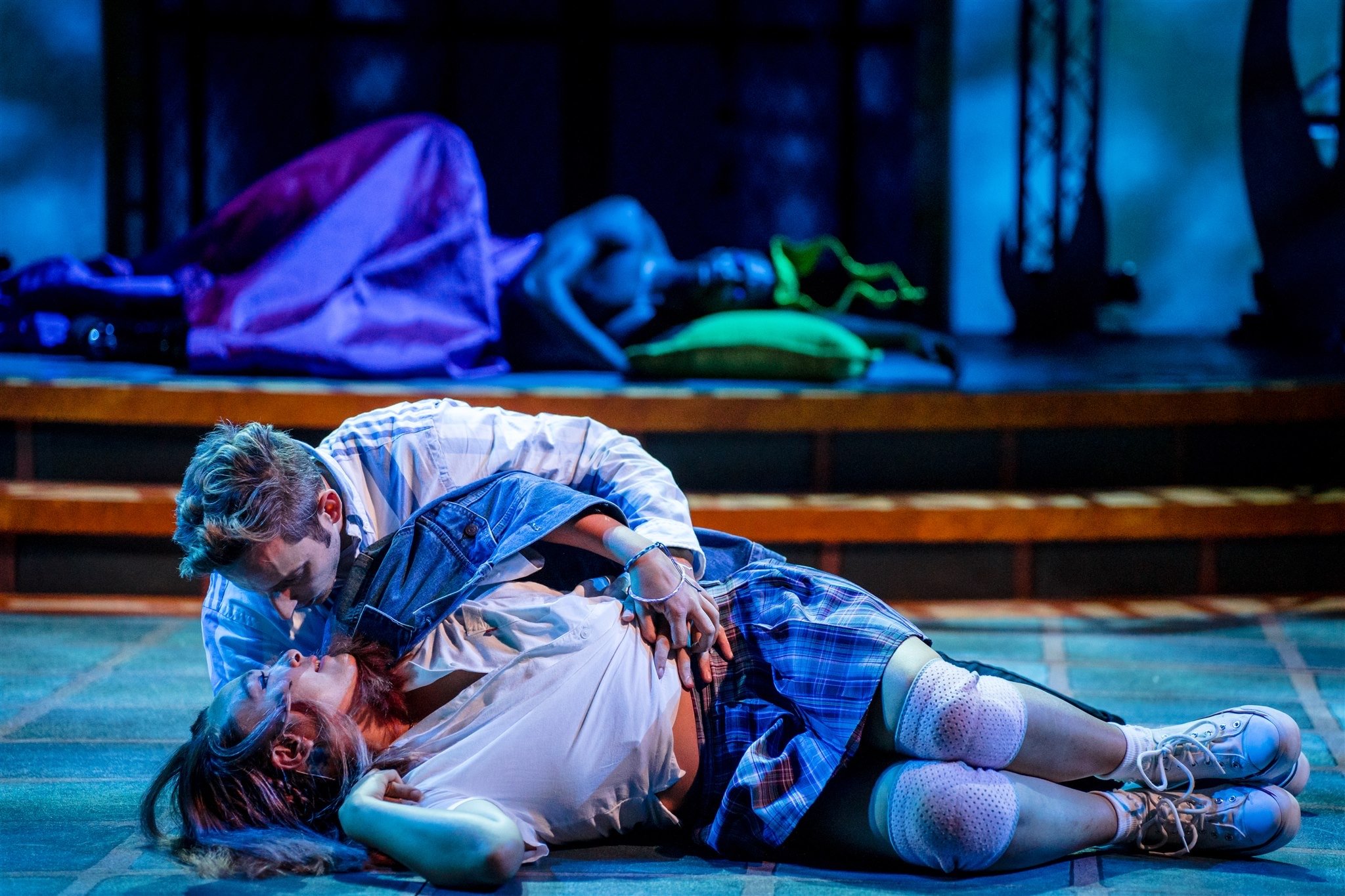FOLGER THEATRE’S A Midsummer Night’s Dream at the National Building Museum
A MIDSUMMER FOR THE CURRENT MOMENT:
Interview with Lili Hokama and Hunter Ringsmith
Review & Interview by Melissa Lin Sturges
Photography by Brittany Diliberto
The Folger Theatre has partnered with The National Building Museum and the University of South Carolina to create an immersive, innovative, and family-friendly production of William Shakespeare’s A Midsummer Night’s Dream. The production, held at The Playhouse, a stage built in the Museum’s Great Hall comes at the hand of renowned international director, Victor Malana Maog and Folger Artistic Director, Karen Ann Daniels.
This romantic romp of a performance brings surprise and intrigue to Shakespeare’s beloved comedy. The audience escapes into the Athenian woods alongside Puck the fairy, Bottom the Weaver, and Titania and Oberon the fairy king and queen and witness the misfires of fate experienced by four lovers: Helena, Hermia, Demetrius, and Lysander. The play is being performed as part of the National Building Museum’s Summer Block Party. At night, The Playhouse turns into a hypnotic place where characters come out to play in the exquisitely lit stage. By day, its a place for theatre-like experiences, behind-the-scene tours, workshops, and other fun activities.
A Midsummer Night’s Dream will be at the National Building Museum from through August 28, 2022. The Playhouse at the NBM is open through August 28, as well. Thursday - Monday, 11am to 4pm. The National Building Museum is located at 401 F St., NW, Washington, DC.
After the play, I had the opportunity to sit down with some of the cast members (Hunter Ringsmith (Lysander) and Lilli Hokama (Hermia) of A Midsummer’s Night Dream to discuss their take on this iconic play.
MELISSA: I often hear of Hermia as a “dream role” for many young female actors. What do you think makes Hermia one of the most beloved Shakespearean heroines? How does it feel taking on this role?
LILLI: I’m beautifully oblivious; I did not know that this was a dream role, but I’m very happy to be here! I can see why it would be so fun. Very few females in Shakespeare’s plays have agency. There is something about Hermia that feels like she has a little more grit. I can see why it’s such an exciting thing to play. And, also, it’s so expansive; It’s not your typical ingenue. She’s got a lot of grit too.. It gives an actor a lot of fun things to play with.
MELISSA: Lysander is a complex and underrated protagonist. What has been the biggest challenge, or the biggest rewards that come with playing this role?
HUNTER: The thing that’s funny about Lysander is he doesn’t have a lot of context other than being in love with Hermia. Helena, at least, she’s into Demetrius and she also has a really strong friendship with Hermia. But for Lysander, his sole focus is on Hermia. I think it has been interesting to play with the idea that these teenagers are going through an extraordinary moment. Hermia’s father basically says: Hermia has to die or bow to my will. Lysander gets to say: No, we will challenge that. We will find a life together. In some ways, that part of it feels heroic. But on the flip side, this love potion is put on. And it’s interesting, because he loves Helena just as hard as he loves Hermia.
We talked a lot in production about what the love potion actually does. And what gets revealed out in the woods. I’m certainly playing with the idea that a vitality and a lifeforce gets awakened in the woods. And it builds to a quartet scene for the lovers where they are all fighting for one another.
MELISSA: That is an incredible scene. And I know you are working with both fight and intimacy coordinators. Tell us what it was like working with an intimacy coordinator? How does it influence you as a character, or motivate you as an actor? How does it impact the play or the production room as a whole?
LILLI: I just want to say that I think every single human being should go through intimacy training. Everything that Chelsea [Pace] (Intimacy Director) brought into the room was extremely helpful. We’re often taught as actors that we are supposed to just say “yes, and…” There’s this idea that if you’re not willing to do this, there are a million other people who are. And it can feel really hard to stand up for yourself in certain rooms. Or, to put boundaries on certain things. Chelsea helped open up that space in a new way and made it clear that it’s okay to state your needs as an actor. You don’t always have to say “yes” because you will have to carry these things with you for the rest of the day, for the rest of your week, and for the rest of your life. There are certain things you may have to negotiate with. Every single person should have those tools and should have that vocabulary and that awareness. I feel really blessed that I’m in an industry that is bringing these things into the room. I wish every single person - every one out there - had this kind of work.
HUNTER: I’d just say Chelsea also gave some really great tools to explore in the room without her - safely. We really had the room to sketch some ideas. The initial setup of the tools was incredibly helpful.
MELISSA: A lot of people believe this is one of Shakespeare’s greatest romantic comedies. And there are others who find it to be more of a farce, or slapstick. There are others who find it actually quite sinister. : Is A Midsummer Night’s Dream a love story?
HUNTER: I think it’s definitely a love story. Someone in rehearsal said: Shakespeare’s work is like a diamond. The light shines through it and you see it refracted in a number of ways. I think you see love refracted in a number of ways in this play. In our choreographic work, we are working with this dance that all the characters do. It’s slightly changed depending on each couple and each piece of music. The tone changes based on each couple. Some of it’s very passionate and fiery. Some of it’s very flirtatious and coy. Some of it is very push-pull. So, in that way we’re getting to see love in a lot of different kinds of light. So, I think in that way it is a love story.
LILLI: I think that diamond reference is so perfect. I think that’s exactly how good stories go. That it can be reflected in many different lights. I am in the camp of thought that it is not our job as artists to tell an audience how to receive a piece. It’s more about how we ignite questions. And ignite feelings and experiences. And so I think going into things with the idea that “oh,this is a love story,” or “oh, this is a tragedy” colors it before I think it needs to be. I think the audience gets to choose more in my personal approach to theater and performance and storytelling. I think it’s more of a tragedy than I realized. I think as we go through this work and we go through this process, it’s told in very fanciful ways and it’s told with a lot of delight and comedy and fanfare. But at the heart of it, it’s so raw. And it’s so real. And this love that Lysander and Hermia have for each other is a first love. It’s an “I will walk through fire for you [sort of] love.” And that’s so incredible to see. [On Titania/Hippolyta] Just to see a more grown, mature love. A different kind of love. But it is still love. That was a very long, roundabout way of saying, I suppose it is a love story.
MELISSA: A love story of your own choosing?
LILLI: Yeah. And I think Helena has a love story with herself. They changed a line (“A Jewel that is mine own and not mine own” originally belonged to Demetrius, her lover) so that she says it. I feel like her growth becomes a thing that’s like - how do I love myself? But we don’t know until we go through the trails of the forest.
MELISSA: That is a really beautiful sentiment. Thank you for your responses. Obviously, things are difficult in D.C. right now. There are also incredible messages in this play and powerful, significant women who occupy this play. How does it feel to bring this piece of theater to D.C. right now?
HUNTER: It’s hard.We are making something that we think has value. And we are making something that lets people come together that’s joyful. And to experience something where there is beauty and where they can see themselves reflected. It shows me that it’s important that people can come together and witness one another. Being in a space like The National Building Museum, it gives me hope being in such a huge space. Look at what humans built together. Theater is an expansion of that. [It says] look at this world we can make together. The act of creation and the invitation for people to participate in this dream that we are building. It is generative and hopefully can unite people’s humanity.
LILLI: I feel very thankful to focus my energies on making something beautiful and meaningful with people I love and respect. That is the best way I can carry through some times. I think Hunter really encapsulated that in a beautiful way.
MELISSA: Is there anything else you hope audiences take away from this production?
LILLI: I’m so excited with their approach to this show. They have little nuggets for so many different people. I think it will be a very eye-catching experience. There will be so much to visually take in. Even if kids come and think, “I don’t know what they said,” they’re still hopefully going to be wrapped up in the movements and the majesty of the costumes and the ways that we embody these people. We have done so much with the text work and the lines - going back to iambic pentameter. I think Shakespeare is such an incredible tool for us. It’s almost like a container because it’s so restrictive. But when you pour water into a container, you can do a lot of cool things! So, I think it actually allows for such incredible things. I think there’s going to be a little bit for anyone and that was informed by the National Building Museum [which does significant children’s outreach]. I was a little being when I fell in love with the theater - anything we can do to reach them is valuable.
HUNTER: It’s a big scale production. It’s grand. It’s romantic. It’s incredibly diverse. It’s A Midsummer Night’s Dream for right now. And that’s really exciting for me.
MELISSA LIN STUGES (she) is a scholar, educator, and practitioner of theatre and performance. She recently moved to DC after having lived and worked in New York City and Philadelphia. She is a creative dramaturg and an advocate for adapting the written archive through performative writing.




